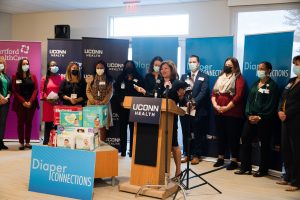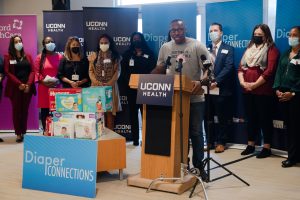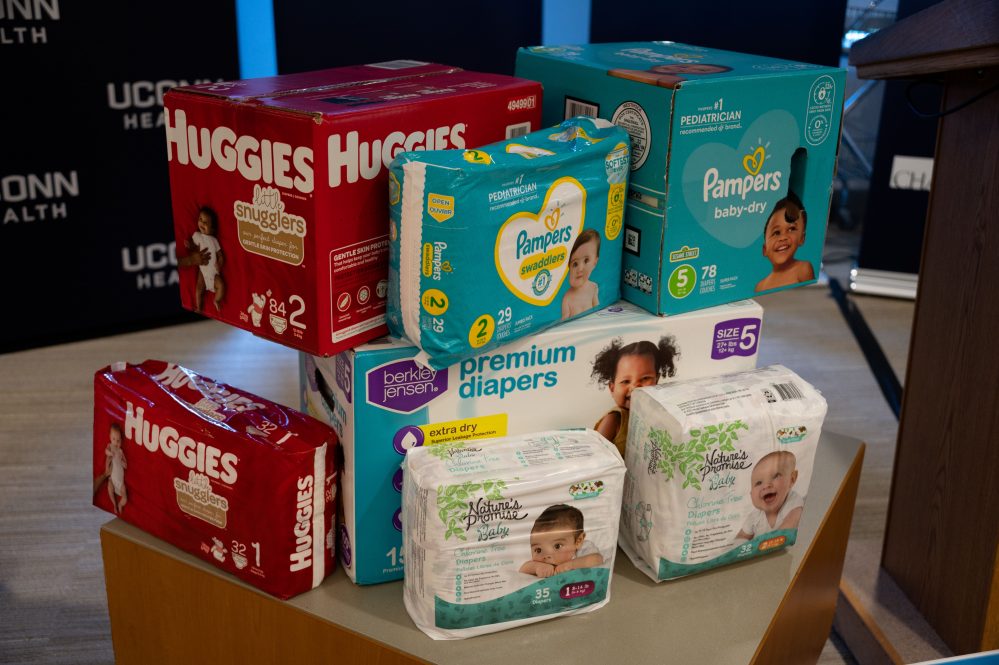Did you know that more than one third of Connecticut families with young children struggle to afford diapers? It’s a staggering statistic, especially for such an essential, every day child care item.
With 35,000 babies born annually across Connecticut hospitals, including 1,000 born at UConn John Dempsey Hospital, there are some Connecticut children living in poverty daily. For example, in the City of Hartford there is a 37.2 percent rate of child poverty with other cities in the state with similar statistics.
This is why Diaper Connections, a new free diaper distribution network for those families struggling financially, is being launched statewide by the Connecticut Diaper Bank in collaboration with the Connecticut Hospital Association and the Connecticut Department of Housing.

This statewide effort is being jumpstarted by The Connecticut Department of Housing with $500,000 in funding and additional resources. Diaper Connections is a new way for Connecticut’s health systems and the Diaper Bank of Connecticut to reach more families and enhance the health status of infants and toddlers and their parents by addressing the very significant problem of diaper need.
The statewide program is launching as a result of the successful summer pilot program of Diaper Connections at UConn Health’s clinics and hospital. UConn Health was the first in the state to standup a program in its Women’s Health and Family Medicine clinics which is already having a positive impact on UConn Health’s maternal-health patients and their children by curbing the diaper worries of families.
“The program simply works by having medical assistants like those at the UConn Health Women’s Center and Family Medicine practices on the front lines of patient care also screen patients during office visits for diaper insecurity,” says Anne Horbatuck RN, BSN, MBA, Chief Operating Officer of UConn Medical Group at UConn Health. “They then offer diaper supplies to those in need in real-time. All data is then tracked in the patient’s electronic health record.”
“We celebrate the new statewide action and solution that is underway, expanding from UConn Health to now every one of the 27 state acute care hospitals,” says UConn Health Interim CEO Dr. Bruce T. Liang. “While it may seem simple and basic to most, our research data shows that diapers are linked to both maternal and child health. Adding just two patient screening questions to assess a family’s diaper needs can be really transformative and life-changing for some moms and babies.”

UConn Health’s pilot Diaper Connections program found that 30 percent of families they screened expressed a need for diaper support. For example, of 249 patients screened 73 were found to be at risk for diaper insecurity. This is 30 percent of families UConn Health serves which also uncovered 14 mothers at high-risk for postpartum depression because of diaper worries. In fact, the data is showing that the No. 1 predictor of postpartum depressive symptoms is diaper insecurity. Plus, simply sharing diaper supplies can cut diaper rash by 33 percent and lead to 77 percent fewer days of diaper rash.
Co-chair of CHA’s Diaper Connections steering group is UConn Health’s Khadija Poitras-Rhea, LCSW, AVP of Population Health. She serves UConn Health’s UConn Medical Group and UConn John Dempsey Hospital.
“Medical practices and hospitals are the perfect place to screen families for diaper insecurity so we can bridge the diaper need gap,” said Poitras-Rhea. “This new statewide Diaper Connections program will serve all communities to immediately make a difference in the lives of families in real-time with diaper supplies. My favorite part of this program is its real-time action and real-time impact on the lives of mothers and their children under 3.”
Joe Zuzel of Hartford Health Care is co-chair of the Diaper Connections steering group: “The Diaper Connections program is an excellent example of how, working together, we can help provide much needed resources to the communities we serve,” said Zuzel, Regional Director Community Health, Backus and Windham Hospital.
Poitras-Rhea stresses: “In the last year, we all know everything is more expensive for families from food to formula to diapers. Our UConn Health staff is thrilled about the impact this program is already having on our patients. It is so rewarding for them to feel they are helping to make a real difference in peoples’ lives with something as simple as diapers.”
The state’s Housing Commissioner agrees.
“We are excited to help provide stability for families,” said Seila Mosquera-Bruno, Commissioner of Housing. “I know firsthand, the struggle that can come with raising children. By providing basic health care supplies such as diapers, we can enable families to free up much needed resources to be utilized elsewhere.”
“I can’t wait to see the success of this powerful program statewide,” says Poitras-Rhea of UConn Health. “Thanks to the CT Diaper Bank and CHA for connecting us all.”
“I applaud everyone for their ongoing commitment to all Connecticut moms, babies, and families in need – you all are making their daily lives better,” concludes Liang, Interim CEO of UConn Health.

And Maurice Edwards is a father of two who was raised in New Haven and now resides in Hamden. He asks that we don’t forget the Dads who may be struggling financially too. He is grateful for the free diapers his family was provided by Yale-New Haven Hospital. He sends to a big “thank you” to all the hospitals and clinics giving free diapers to those in need through Diaper Connections since it makes a big difference.
Children without enough clean, dry diapers suffer a higher incidence of urinary tract infections, diaper dermatitis, and more days with diaper rash. Because childcare programs often require a full week’s supply of diapers in order for a child to attend, parents who cannot afford to buy diapers must miss school or work. Additionally, the psychological weight of diaper need — with such a profound impact on the flow of daily life — is a common cause of maternal depression and stress on parents. Children whose parents are stressed or depressed are at greater risk for social, emotional and behavioral problems.
Diaper Connections will now offer diaper distribution through local hospitals and established local hospital partners, to ensure supplies of diapers are available each month to families who need them. The program aims to improve the health of families by preventing problems associated with diaper need. In addition, the program has the potential to increase parents’ ability to gain education or advance their career, thus increasing the potential for economic success for some families. A 2018 University of Connecticut study concluded that every dollar spent relieving diaper need produced an 11-fold increase in personal income for families struggling to afford diapers.
“DBCT is proud to partner with the Connecticut Hospital Association, Connecticut Hospitals, and the Department of Housing to ensure that more local residents and families can get diapers who need them,” said Janet Stolfi Alfano, executive director of DBCT.
“The Connecticut Hospital Association is honored to support this work to ensure families seen at hospitals across the state have resources that meet their basic needs, such as diapers,” observes Selina Osei, Director of Health Equity and Community Engagement at CHA. “At its absolute best, Diaper Connections has the potential to establish a framework of support that can improve overall maternal and child health outcomes that we know are linked to diaper insecurity.”
Parents and caregivers can check their eligibility for free diapers by contacting the hospital or health system where they receive care or the Diaper Bank of Connecticut. Eligibility is based on two simple screening questions, generally based on household income, or on current participation in a safety net program such as Medicaid. There is a short application once eligibility is established.
Learn more at: www.thediaperbank.org



